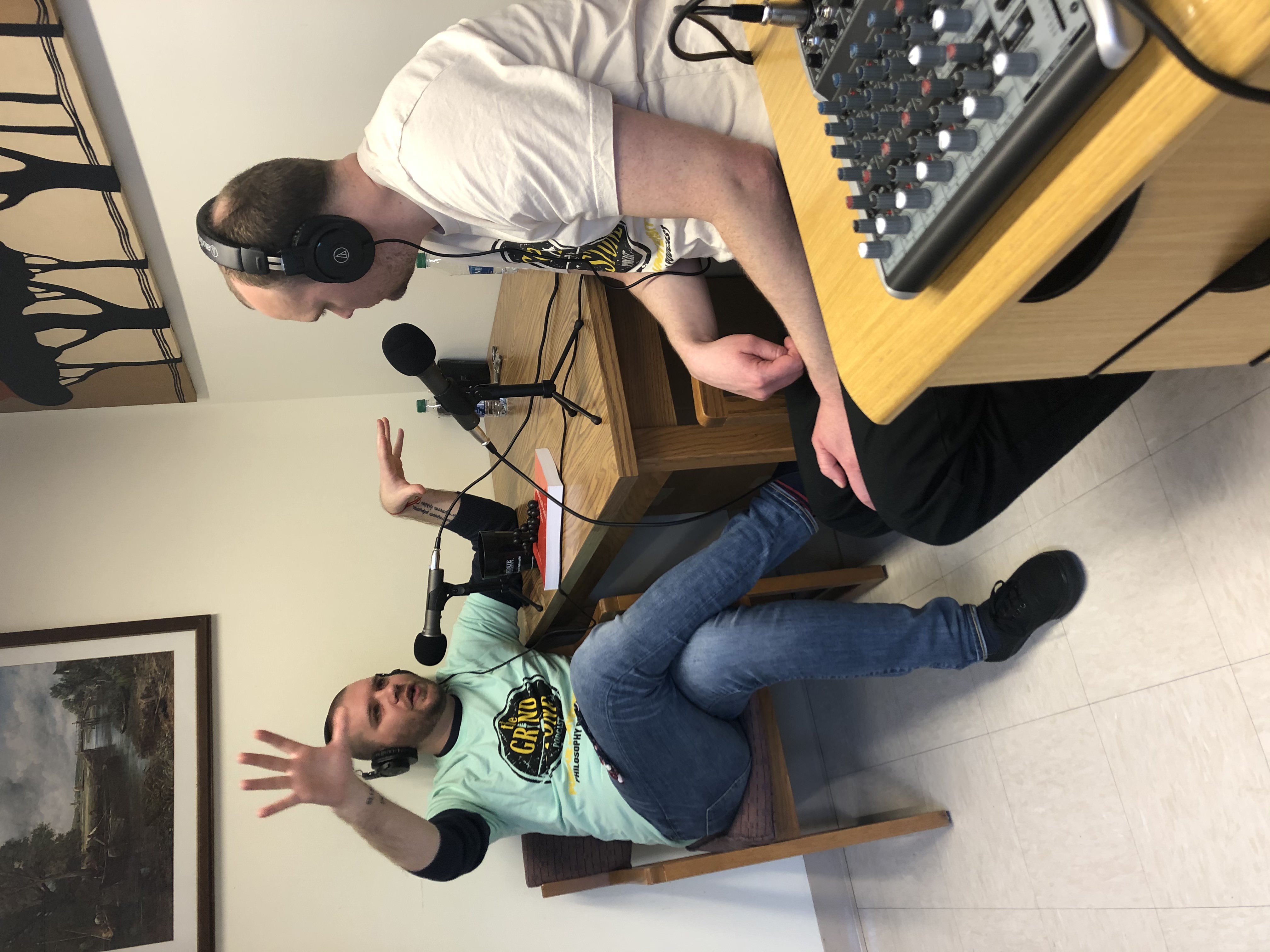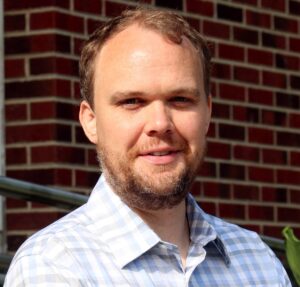Perspective via podcast
Philosophy department’s ‘Grindstone’ podcast seeks experts’ insights on the COVID-19 pandemic.

Casual listeners probably will not notice, but Matthew Kroll occasionally catches it in the sound of his own voice.
Kroll and cohort Caroline Cross spent several weeks over the summer recording and editing new coronavirus-related episodes of “The Grindstone,” the Department of Philosophy’s podcast. Mirroring the way daily news cycles have included wild shifts between depressing developments and periods of optimism, Kroll can detect times where the news seemed particularly bleak by his somber tone during certain interviews.
In this way, Kroll said, these COVID-19 episodes function as a time capsule that illustrates what it has been like to live through a global pandemic.
“It’s not just about COVID-19 from an epidemiological perspective or the ethics of wearing a facemask,” said Kroll, the philosophy department’s academic program manager who created and hosts the podcast. “It’s about it in the sense that we’re recording this as we go through it. It’s really our own experience of what this process has been – not just the podcast process, but you talk to one person on May 8 and you talk to another person on May 28 and a lot of stuff changed in those 20 days, including people’s tones of voice.”

A traditional episode of “The Grindstone,” which launched in spring 2019, features a casual conversation between Kroll and a guest philosopher, aiming to discuss philosophical questions in ways that make the discipline accessible to a general audience. During spring semester, once it became apparent that the virus’ spread would disrupt the school year and virtually every aspect of life as we know it, Kroll and Cross decided to use their platform in a new way.
They decided to interview experts from Purdue and beyond, inviting them to share their perspectives on how COVID-19 has impacted their fields of expertise.
“We have this space in which we can speak about these things and find out about these things in ways that most people don’t get the opportunity to do so,” said Cross, a senior philosophy and English major who mixes, edits, and produces the podcast. “So we feel like we should do something because we have questions just as everybody else has questions. If we have the ability to reach out to people and ask these questions, why not do that and put it out there for everybody and for ourselves?”
They also chose to alter the show’s typical format, opting to have most episodes in the weekly series revolve around a theme instead of a single conversation. Episodes featured insights from an array of experts in the fields of medicine, public health, economics, philosophy, and history.
Kroll and Cross introduced the series on June 17, with new episodes releasing every Friday starting with “On Trolley’s Shutdowns and Face Masks” on June 19. The episode featuring Faithe Day, assistant director of the COVID Black taskforce on Black health and data, is the only one that featured a single guest.
“Given the topic and the general national tenor around these conversations, we thought it was best to just explore this as its own episode,” Kroll said.
Cross agreed, noting that the data Day shared about the inequities in the healthcare system ranked among the most eye-opening elements of the many memorable interviews she and Kroll conducted for the series.
“She blew my mind talking about the racial injustice that has been part of this country for forever, but especially how COVID in general has brought to light the way people of color, or Black people, have really been affected by COVID-19 because of the injustices that existed before in their communities,” Cross said. “It was heartbreaking, but it was also something that needed to be talked about.”
Other Purdue faculty members and graduate student contributors include Professor of Philosophy Daniel Kelly, Assistant Professor of Economics Jillian Carr, Assistant Professor of One Health Epidemiology Audrey Ruple, Assistant Professor of Public Health Nilupa Gunaratna, history graduate student Caitlin Fendley, and philosophy graduate student Tom Doyle.
Their insights created another unique aspect of the podcast series, Kroll said.
“It’s got a Purdue focus. We get a lot of information and data out there, but we also have a lot of guests who are very passionate and treat it with humanity,” Kroll said. “That’s been really important to us: We’re showing the human side, not just of all of us going through this together, experiencing this pandemic, but the human side of the researchers and how people approach these questions, moral, epidemiological, economic, or otherwise. I think that has been one of the really cool parts of it.”
Other episodes in the weekly series addressed topics such as economics, supply chains, and essential labor; physical and mental health and the implications involved with isolation; and what the post-pandemic world might look like, culminating with the series conclusion on Aug. 7.
It was a painstaking process to assemble the interview clips for each episode, on top of writing and recording the narratives that tied together the clips addressing each weekly theme. But Kroll and Cross agreed that the extra effort was well worth it, as the end result is both enlightening and illustrative of the depth of expertise that exists on the Purdue campus.
“There’s been times where we’re like, ‘Wow, that was so insightful and informative, but also kind of scary and heavy,’” Kroll said. “That’s been part of the process is us peeling back these layers of information and data, but also realizing how many cool people are here at Purdue.”